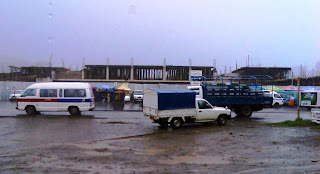The workshop itself went well, with the participants actively engaging in what we taught, but as usual they really struggled to find the main teaching point of a Bible passage and to think how to teach that to children. Once again, I found myself asking God, “What can we do? How can we help people to grow in a knowledge of God’s Word? How can these teachers teach children the Bible effectively, if they themselves do not know your Word and don’t receive good teaching in the church?” Some of the teachers didn’t even have a Bible, yet alone any other resources! (We took books to sell, including Bibles, as they have no other way of accessing these resources other than to take the bus-converted-from-a-lorry public transport to nearby towns over four hours away). Despite this, I hope and pray that they will all have learned a few new skills that will help them in their role as Sunday school teachers, and if nothing more, they will have been encouraged that what they are doing is important and will have gained a new vision for their work.
Isoko itself is a beautiful place, and our Coordinator there took us for walks to show us more of the area – hence my impressions of mountains, red soil and banana trees! I loved the community village feel – the Coordinator seemed to know everyone and had a word to say to just about everyone we met! (‘Mwagona’ is the first greeting you make in the Ndali language).
And finally you might be wondering what the ‘rice and beans’ is about. For six out of the seven meals that we ate on the trip, we had rice and beans! I confess to taking my own little supply of food for breakfast – snack bars, bananas and Ribena! While I would choose beans over greasy meat stew any day, by the sixth time I had definitely lost my appetite for them!









